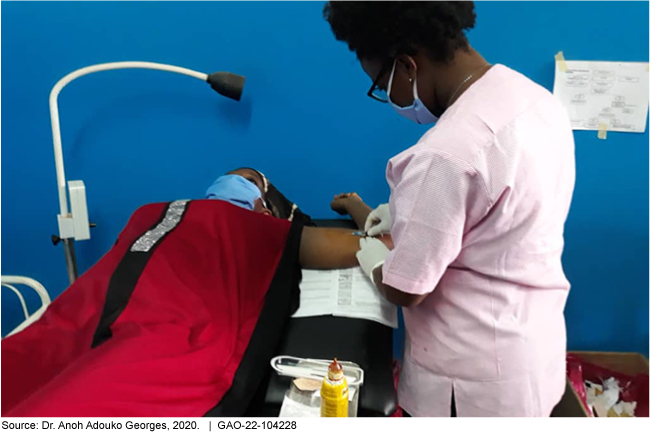International Family Planning Assistance: USAID Has Faced Implementation Challenges Related to U.S. Policy and COVID-19
Fast Facts
Some U.S. global health funding goes to family planning and reproductive health services. A U.S. policy change and the COVID-19 pandemic affected these services.
From 2017-2021, to receive U.S. funds, foreign nongovernmental organizations had to agree not to perform or promote abortion.
Effects of this policy included:
- Disrupted access to services while USAID looked for replacements for 2 large NGOs that declined to comply
- Reduced services when some NGOs discontinued allowed services due to confusion or fear of violating the policy
And due to COVID-19, some NGOs reduced the need for clinic visits by providing longer-lasting contraceptives.
Midwife Inserting a Contraceptive Implant at a Health Care Facility in Côte d’Ivoire

Highlights
What GAO Found
In fiscal years 2018 through 2020, the U.S. Agency for International Development (USAID) obligated nearly $1.7 billion for family planning and reproductive health (FP/RH) assistance. Obligations in Africa made up approximately half of this funding. In the three missions GAO selected for its review—Senegal, Uganda, and the Ghana-based West Africa Regional Program—USAID funded a variety of activities in four areas: improving the accessibility and quality of family planning services; increasing demand for FP/RH services through media communications and outreach; procuring contraceptives and supporting the supply chain; and strengthening health care systems. USAID's FP/RH assistance also leveraged other areas of USAID's health assistance, such as HIV services, post-partum care, and nutrition programs, according to USAID documents.
Mobile Clinic in Senegal Funded by U.S. Agency for International Development

The Protecting Life in Global Health Assistance (PLGHA) policy—implemented in May 2017 and rescinded in January 2021—required foreign nongovernmental organizations (NGO) to agree, as a condition of receiving U.S. global health funding, that they would not perform or actively promote abortion as a method of family planning or provide financial support to any foreign NGO that conducts such activities. According to various sources, this had several adverse effects on implementation of FP/RH assistance. For example, in Senegal, Uganda, and the West Africa regional program, some service gaps and delays resulted after two of the largest implementing partners declined the PLGHA terms and conditions. USAID and implementing partners that accepted those terms and conditions found new organizations to fill most service gaps, but some adverse effects of the policy may have persisted after it was rescinded. For example, owing to confusion about the policy and fear of its reinstatement, some implementing partners that had accepted the PLGHA terms and conditions reduced their collaboration with partners that had declined them.
USAID and its implementing partners reported taking steps to address implementation challenges caused by the COVID-19 pandemic. For example, fear of infection, social distancing requirements, and transportation constraints reduced access to health care facilities. To address these challenges, implementing partners took steps such as encouraging the use of longer-lasting contraceptive methods to decrease women's need to visit clinics.
Why GAO Did This Study
According to USAID, the U.S. is the largest donor of bilateral FP/RH assistance to increase opportunities for voluntary healthy timing and spacing of pregnancies. This assistance also contributes to several other positive development outcomes, including reducing maternal and child mortality and HIV transmission, according to USAID. However, in a 2020 report, GAO identified instances in which FP/RH implementing partners declined the PLGHA terms and conditions and, as a result, stopped receiving planned funding that was not yet obligated under their awards. In addition, the World Health Organization and the United Nations Population Fund warned that the COVID-19 pandemic could severely disrupt access to FP/RH services for millions of women.
GAO was asked to review USAID's international FP/RH assistance. This report describes (1) the FP/RH assistance USAID provided in fiscal years 2018 through 2020, (2) the PLGHA policy's effects on the implementation of FP/RH assistance as well as actions USAID and its implementing partners reported taking to mitigate adverse effects, and (3) implementation challenges caused by the COVID-19 pandemic as well as steps USAID and its implementing partners took to address them.
GAO analyzed USAID funding data. GAO also reviewed USAID and implementing partner documents for FP/RH assistance in Senegal and Uganda and in the West Africa region, through USAID's West Africa Regional Program. In addition, GAO interviewed USAID officials, implementing partners, and other donors and reviewed studies of family planning assistance.
For more information, contact Jason Bair at (202) 512-6881 or bairj@gao.gov.
